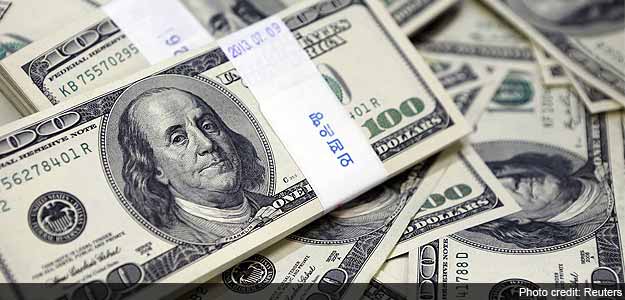
The dollar nursed losses early on Wednesday after taking its biggest one-day fall so far this month, though most observers felt it was just a hiccup in the currency's long-term uptrend.
In part the dollar was a victim of its own success having climbed for most of the past four weeks to provide bulls with tempting profits.
"There was no obvious catalyst for the dollar pullback but USD losses coincided with a retreat in equity markets and lower US front-end yields," analysts at BNP Paribas wrote in a note to clients.
Yet fundamentals favour the currency given the Federal Reserve remains on track to hike interest rates later this year.
"We expect to see good interest to buy the US currency on this pullback and we remain generally bullish," says BNP.
The dollar index last stood at 97.314, down from Tuesday's 98.151 - a high not seen since late April.
It recoiled to 123.90 yen from a six-week high of 124.48, while the euro rebounded to $1.0937, pulling away from a three-month trough of $1.0808 set on Monday.
US stocks fell on Tuesday as results from IBM and United Technologies dampened optimism for the earnings season. The blow to stocks made bonds look more attractive in comparison and nudged Treasury yields lower, in turn weighing on the greenback.
With the dollar on the backfoot for now, commodity currencies were given a hand up.
The Australian, Canadian and New Zealand currencies all peeled off six-year troughs set in recent sessions.
The Aussie popped back above 74 US cents, climbing from a low of $0.7328, while its kiwi peer rose above 66 US cents from $0.6498.
The loonie advanced to C$1.2946 per dollar, edging off Monday's trough of C$1.3025.
The Aussie's immediate fortunes hinge on inflation data due at 0130 GMT and a speech by the head of the Reserve Bank of Australia (RBA) at 0305 GMT.
The RBA is of the view that the Aussie needs to weaken further to help offset bigger falls in commodity prices such as iron ore, Australia's single biggest export earner.
The risk of fresh verbal intervention from Glenn Stevens could keep the Aussie capped for now.
There is little else in terms of market-moving data for Asia on Wednesday. In Europe, the Bank of England (BOE) will publish the minutes of its July policy meeting.
Repeating comments made earlier in the month, BOE Governor Mark Carney said on Tuesday the central bank will need to decide around the turn of the year whether the time is right to start raising rates.

No comments:
Post a Comment